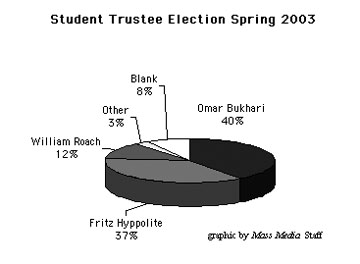In a surprising upset in the student government elections, Omar Bukhari beat out Fritz Hyppolite by five votes for the office of student trustee.
In the April 7-10 elections, Hyppolite, freshman chair of the Student Senate’s Campus and Community Affairs Committee (CCA), was expected by many to take the title over Bukhari, an international student and chair of the Budget and Finance Committee.
Bukhari racked up a total of 141 votes to Hyppolite’s 136, while William Roach, vice chair of CCA, trailed behind with 44.
This year’s race was especially significant because UMass Boston’s student trustee will have a vote on the Board of Trustees come next academic year. While all five UMass campuses have student representatives to the board, only one may vote. Each year the vote rotates between campuses.
Bukhari also topped the College of Arts and Science (CAS) elections for senators with 110 votes, with Hyppolite right behind at 92. All on the ballot got in more or less by default, since there were 8 candidates running for a total of 15 seats to represent CAS. Write-ins got nearly 20% of the vote in CAS elections, with nominations ranging from “Punk Rock Mike” to “Micheal Moore,” and oddly enough, a fair amount for nearly everyone on The Mass Media staff. None of the write-in candidates were able to get enough votes to make it onto the senate, saving UMass Boston from a possible acceptance speech by “Micheal Moore.”
Some fresh blood will be making its way to the senate, with Colleen O’Malley, Nicole Motte, and Andre Lima representing CAS, Jessica Dawn for the College of Public and Community Service (CPCS), and Robert Nappier for the College of Management (CM). Many have pledged to work hard to represent the students, with Nappier noting in his platform, “I promise to bring increased transparency to Student Senate actions…The Student Senate will again answer to our constituents: the students.”
The election returns have also highlighted a perennial problem for the Student Senate: low voter turnout. All candidates were installed by less than three percent of UMB’s 13,000 students.
Voter turnout has declined since last year, from 528 total votes cast to 362, despite increased advertising, debates, and promotion of voting online. The majority of votes were cast on UMass Boston’s website. Students put in their names and their student I.D. numbers, then voted for the senators from their respective colleges. Students may only vote within their college (CAS, CM, CN, and CPCS)
Low voter turnout may be attributed to the fact that many see as the senate as a laughingstock. In the fall semester, the senate most notably made headlines for bickering, handing out money to various student organizations, and bickering. There have been fewer flare-ups these past few months, as many senators have jumped ship for one reason or another.
For a large part of the semester, the Student Senate and members of the Office of Student Life worked to get the word out about the student elections. An Ad Hoc Committee on Elections was formed to oversee the process, and students sat in on two debates which allowed senate candidates take the time to inform the audience about themselves and their goals.
Asked about the number of people who take the time to vote in the elections, Director of Student Life Joyce Morgan replied, “It varies from year to year. In my opinion, we’ve had slightly higher turnout when it’s been MassPIRG referendum years. This not being one, I would anticipate that our voter turnout will be mild.
“We’ve tried to do a little bit more promotion of elections this year, we’ll be able to see if it’ll have any effect or not.”
Every other year, MassPIRG comes up as a referendum question during the elections, and the student body can vote whether or not to maintain the group to which they can choose to pay an optional fee.
“Our election numbers during non-MassPIRG years have ranged between 300-600,” Director Morgan added.
For the 2002-2003 school year, UMass Boston enrolled over 10,000 undergraduates.
There are certain rules regulating the makeup of the senate. No one college can have more than 50% of the senators, so with a maximum of 30 Senators allowed to the SGA, a maximum of 15 senators may come from College of Arts and Sciences, despite the fact that the CAS enrolls more than 50% of the student body. Five senators apiece come from CPCS and the Colleges of Management and Nursing. There are no minimums.
“The breakdown of the senate will probably change a little bit next year as the colleges move to having a College of Arts and a College of Sciences,” Director Morgan remarked. “We’re going to have to see what the numbers are for each of those colleges.”
The Student Government Association, according to it’s constitution, “exists to provide a democratic and formal vehicle to represent the interests of students in all aspects of university life, and to promote student leadership at the University of Massachusetts at Boston, and to enhance the educational, cultural, and community experience of the students.”





















































